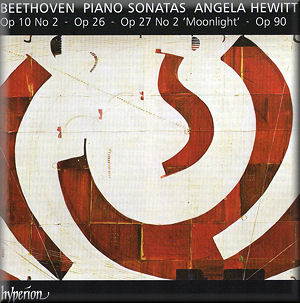 |
 |
|


alternatively
CD:
AmazonUK
AmazonUS
MDT
|
Ludwig van BEETHOVEN (1770-1827)
Piano Sonatas:
No. 12 in A flat, Op. 26 (1800-01) [19:13]
No. 6 in F, Op. 10 no. 2 (1797) [16:19]
No. 27 in E minor, Op. 90 (1814) [13:22]
No. 14 in C sharp minor, Op. 24 no. 2, “Moonlight” (1801) [14:58]
 Angela Hewitt (piano)
Angela Hewitt (piano)
rec. Das Kulturzentrum Grand Hotel, Dobbiaco, Italy, 30-31 August, 1-2 September 2009
 HYPERION CDA67797 [63:54]
HYPERION CDA67797 [63:54] 
|
|
|
The placement of the Op. 26 Sonata first plays to Hewitt’s
strengths. Her voicing of lines in the theme of the opening
“Tema con variazioni” is cleaner than I have ever heard it.
Indeed, her very cleanliness of texture brings Perahia to mind
in this repertoire. Her treatment of sighing motifs in Variation
III seems to harken back to Baroque Affektenlehre, and
indeed there seems little forward-looking here. Yet there are
gains – the clarity of melody in Variation V - projected to
just the right degree - for example. The highlight of Hewitt’s
reading is the “Marcia funebre sulla morte d’un eroe”, a relentless
dwelling on the finality of death. As Hewitt points out, in
contrast to Chopin’s famous March, there is no ray of light,
no vision of Heaven, to contrast here. Hewitt instead refers
to volleys of cannon-fire shot over the grave in the central
section, and one can hear exactly what she means. The brief
finale features sforzandi that are like a boxer’s jab.
We are a long way from a gritty Richter or a monumental Gilels
here, yet Hewitt’s entirely individual yet completely cogent
viewpoint is both valid and rewarding. Insights flow apace as
the work unfolds before our ears.
The small but beautifully formed Sonata, Op. 10 No. 2, receives
a delightful account here. Charm sits next to Beethovenian storm.
Hewitt sees this sonata as “basically a comedy” over which hovers
Haydn. Her first movement is exquisitely formed. She stretches
the drama to its boundaries without ever exceeding them. Hewitt’s
second movement may raise the odd eyebrow, for it is more contemplative
than most, with the Trio seeming remarkably Schubertian. Quoting
Tovey, Hewitt warns against an over-enthusiastic tempo for the
finale. Hewitt’s tempo gives plenty of space for some delicious
articulation while fully honouring the playful nature of the
music.
The E minor Sonata, on the cusp of the composer’s late period,
finds Hewitt in exploratory mood. The second movement suits
Hewitt perfectly, with its often Schubert-lied-like demeanour.
An atmosphere of tranquillity is superbly rendered here, enabled
by Hewitt’s perfect legato touch.
Tranquillity is a key facet of Hewitt’s first movement of the
so-called “Moonlight”, which she manages to project with a speed
that nevertheless captures movement. The accents of the finale
certainly have force - if not rivalling Pollini’s missiles,
on DG - but Hewitt also honours the quieter moments. She is
expert, too, at the dramatic gesture - around six minutes in.
Hewitt provides her own notes, mixing autobiographical elements
with musical insight. This is characteristically thought-provoking
playing, although none of the four performances topple any of
the greats in this repertoire. The recording however is exemplary
and is perfectly judged by the producer, Ludger Böckenhoff.
Colin Clarke
|
|















